Navigation
Several major donors have made multi-year commitments to provide significant funding to the United Nations Central Emergency Response Fund (CERF) which aims to save scores of thousands of lives by providing virtually immediate financing in sudden-onset crises, like earthquakes or hurricanes, or for ongoing but neglected emergencies.
Several major donors have made multi-year commitments to provide significant funding to the United Nations Central Emergency Response Fund (CERF) which aims to save scores of thousands of lives by providing virtually immediate financing in sudden-onset crises, like earthquakes or hurricanes, or for ongoing but neglected emergencies.
The report, Towards Sustainable Production and Use of Resources: Assessing Biofuels, presented by the United Nations Environment Programme (UNEP) on 16 October 2009 is based on a detailed review of published research up to mid-2009 as well as the input of independent experts world-wide.
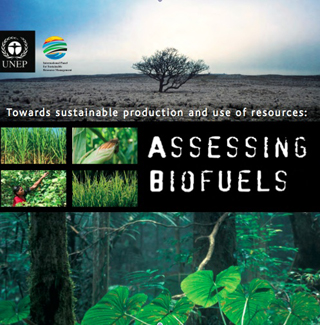 |
| Assessing Biofuels concludes that a far more sophisticated approach needs to be taken when developing biofuels as an environmentally-friendly energy option. |
Scotland's potential renewables capacity is estimated to be around 60GW. Our waters hold around ten per cent of Europe’s wave power potential and as much as a quarter of its tidal power potential. The European Marine Energy Centre (EMEC) provides world-leading test facilities for Aquamarine and other companies to develop the technology needed to harness this huge untapped potential.
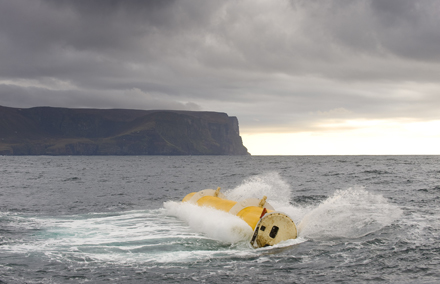 |
| Oyster in operation at the Billia Croo Site near Stromness, Orkney The Oyster system consists of a hinged flap connected to the seabed at around 10m depth. Each passing wave moves the flap which drives a hydraulic piston to deliver high pressure water to an onshore turbine which generates electricity. |
Argentina, Cambodia, Ecuador, Nepal and Sri Lanka join the UN-REDD Programme, Denmark becomes a new donor and Panama gets approval of its UN-REDD national programme
Argentina, Cambodia, Ecuador, Nepal and Sri Lanka join the UN-REDD Programme, Denmark becomes a new donor and Panama gets approval of its UN-REDD national programme
Started in the year 2000, Census of Marine Life (CoML) is an international science research program uniting thousands of researchers worldwide with the goal of assessing and explaining the diversity, distribution and abundance of marine life - past, present and future - by 2010.
Started in the year 2000, Census of Marine Life (CoML) is an international science research program uniting thousands of researchers worldwide with the goal of assessing and explaining the diversity, distribution and abundance of marine life - past, present and future - by 2010.
"Blue Carbon - The Role of Healthy Oceans in Binding Carbon," a new Rapid Response Report released on October 14, 2009 estimates that carbon emissions equal to half the annual emissions of the global transport sector are being captured and stored by marine ecosystems such as mangroves, salt marshes and seagrasses.
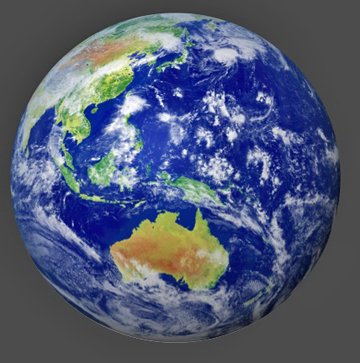 |
| “Out of all the biological carbon captured in the world, over half is captured by marine living organisms hence it is called blue carbon.” iStockphoto/Jan Rysavy |
"Blue Carbon - The Role of Healthy Oceans in Binding Carbon," a new Rapid Response Report released on October 14, 2009 estimates that carbon emissions equal to hal
Scientists have identified an unexpected metabolic ability in a symbiotic community of deep-sea microorganisms that may help solve a lingering mystery about the world's nitrogen cycle.
 |
| 3-D fluorescence in situ hybridization (FISH) image of symbiotic microbes from the deep sea. |
Society stands at a crossroads. With growing problems such as resource depletion, energy sustainability, environmental degradation and climate change, can we protect the health of the planet while achieving widespread economic prosperity?
Society stands at a crossroads. With growing problems such as resource depletion, energy sustainability, environmental degradation and climate change, can we protect the health of the planet while achieving widespread economic prosperity?
The Waste Management Project is part of a £20 million UK-funded programme to improve the sustainable use of natural resources in Sudan, to be carried out by the United Nations Environment Programme (UNEP) over the next three years.
The Waste Management Project is part of a £20 million UK-funded programme to improve the sustainable use of natural resources in Sudan, to be carried out by the United Nations Environment Programme (UNEP) over the next three years.
Gareth Thomas, Minister of State at the UK Department of International Development (DFID) visited Juba on October 16, 2009 to launch a UNEP project to establish long-term waste management capacity in Southern Sudan.
Bill Gates, co-chair of the Bill & Melinda Gates Foundation, on Thursday, October 15, 2009 will urge governments, donors, researchers, farmer groups, environmentalists, and others to set aside old divisions and join forces to help millions of the world's poorest farming families boost their yields and incomes so they can lift themselves out of hunger and poverty.
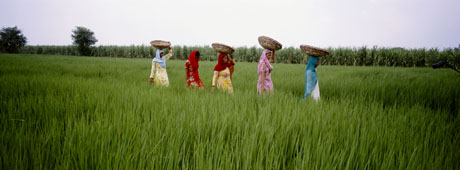 |
| Workers walk through a rice field where farmers use zero-tillage, a farming practice that helps retain nutrients by decreasing disturbance in the soil. Jundla village. Karnal, Haryana, India, 2009. |
The U.S. Fish and Wildlife Service on October 8, 2009 announced the designation of critical habitat for the southwest Alaska Distinct Population Segment of the northern sea otter (Enhydra lutris kenyoni) under the Endangered Species Act of 1973, as amended.
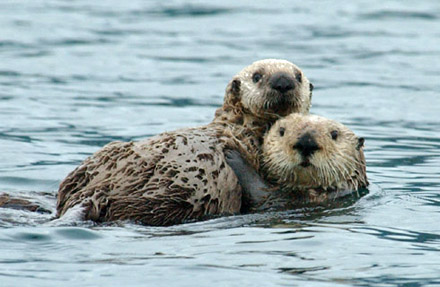 |
| Recovery Otters from the Southwest Alaska Sea Otter Recovery Team (SWAKSORT) Photo: U.S. Fish and Wildlife Service Courtesy of Randall Davis |
The U.S.
The campaign to plant seven billion new trees as part of an effort to encourage governments to reach agreement on a climate change pact in Copenhagen this December has achieved its goal, the United Nations (UN) announced on September 21, 2009.
The campaign to plant seven billion new trees as part of an effort to encourage governments to reach agreement on a climate change pact in Copenhagen this December has achieved its goal, the United Nations (UN) announced on September 21, 2009.
The global public’s desire to see action on climate change was clearly spotlighted on September 21, 2009 with the announcement that the Billion Tree Campaign has reached 7 billion trees—one for every person on the planet.
The Pew Center on Global Climate Change on September 29, 2009 launched a new Corporate Energy Efficiency Web Portal that features a myriad of resources designed to help businesses develop new and stronger energy efficiency strategies.
The Pew Center on Global Climate Change on September 29, 2009 launched a new Corporate Energy Efficiency Web Portal that features a myriad of resources designed to help businesses develop new and stronger energy efficiency strategies.
In a feat of reverse-engineering, Christian Braudrick of University of California at Berkeley and three coauthors have successfully built and maintained a scale model of a living meandering gravel-bed river in the lab. Their findings point to the importance of vegetation to reinforce the banks and to the importance of sand in healthy meandering river life.
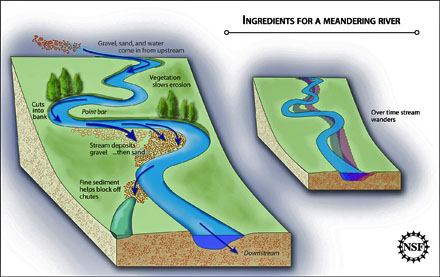 |
| By reverse-engineering a meandering stream, researchers have shown two ingredients to be very important: vegetation to reinforce banks and prevent erosion, and sand to build point bars and block off cut-off channels and chutes. This knowledge will help stream restoration efforts in the future. |
- 2009 Stockholm Water Prize
- biogas
- cooking
- Dr. Bindeshwar Pathak
- effluent treatment
- electricity
- Global climate change
- hand washing
- heating
- human dignity
- human waste twin pit
- pit latrines
- pour-flush toilet system
- sanitation
- Sulabh International Social Service Organisation
- Sweden
- toilets
- Sanitation
- Water
- Water and Sanitation
Dr. Bindeshwar Pathak received the 2009 Stockholm Water Prize at a Royal Award Ceremony and Banquet during the World Water Week in Stockholm on August 20.
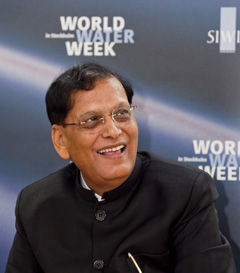 |
| Dr. Pathak at World Water Week. Photo SIWI |
Dr. Bindeshwar Pathak received the 2009 Stockholm Water Prize at a Royal Award Ceremony and Banquet during the World Water Week in Stockholm on August 20.
Inadequate sanitation and its devastating effects on the world’s poor comprise humanity’s most urgent, yet solvable crisis, according to international leaders and experts who convened at the 2009 World Water Week in Stockholm.
Inadequate sanitation and its devastating effects on the world’s poor comprise humanity’s most urgent, yet solvable crisis, according to international leaders and experts who convened at the 2009 World Water Week in Stockholm.
Improving drinking water safety in the Latin American and Caribbean region is the focus of two new bi-lateral agreements between The International Water Association (IWA) and the Peruvian Ministry of Health and the United States Department of State.
Improving drinking water safety in the Latin American and Caribbean region is the focus of two new bi-lateral agreements between The International Water Association (IWA) and the Peruvian Ministry of Health and the United States Department of State.
More than 150,000 species pages populated with expert-verified text and images are now available on the Encyclopedia of Life (EOL) at EOL.org. The EOL is a fast-growing inventory expected to shed new light on everything from conservation strategies for endangered species to climate change and the movements of disease-bearing or invasive pests.
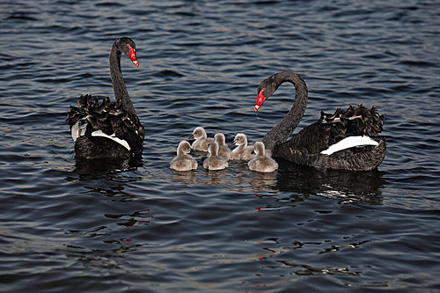 |
| Black swans,Cygnus atratus, Photographed at Lake Okareka, New Zealand. |
Giving poor people a say in the water and sanitation services they receive, and allowing alternative documentation to prove residence are some of the simple solutions that can bring sustainable water and sanitation services to the hundreds of millions currently living without, according to a new report released on August 18, 2009 by the Water and Sanitation Program (WSP).
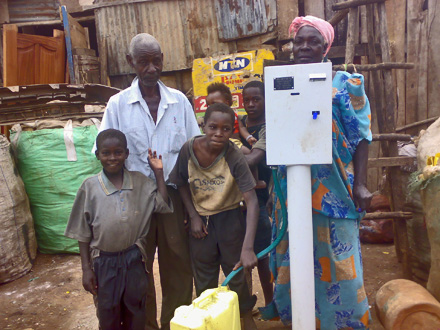 |
| Happiness brought about by affordable clean water for urban poor. |
Flower Garden Banks National Marine Sanctuary is among the healthiest coral reef ecosystems in the tropical Caribbean and Gulf of Mexico, according to a new National Oceanic and Atmospheric Administration (NOAA) report.
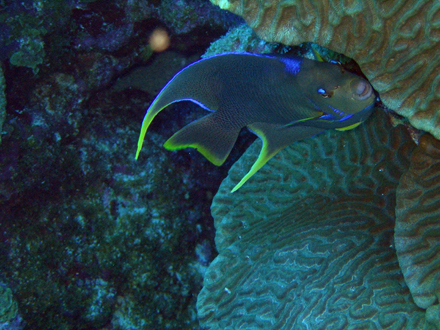 |
| Blue angelfish. |
Search
Latest articles
Agriculture
- World Water Week: Healthy ecosystems essential to human health: from coronavirus to malnutrition Online session Wednesday 24 August 17:00-18:20
- World Water Week: Healthy ecosystems essential to human health: from coronavirus to malnutrition Online session Wednesday 24 August 17:00-18:20
Air Pollution
- "Water and Sanitation-Related Diseases and the Changing Environment: Challenges, Interventions, and Preventive Measures" Volume 2 Is Now Available
- Global Innovation Exchange Co-Created by Horizon International, USAID, Bill and Melinda Gates Foundation and Others
Biodiversity
- World Water Week: Healthy ecosystems essential to human health: from coronavirus to malnutrition Online session Wednesday 24 August 17:00-18:20
- Mangrove Action Project Collaborates to Restore and Preserve Mangrove Ecosystems
Desertification
- World Water Week: Healthy ecosystems essential to human health: from coronavirus to malnutrition Online session Wednesday 24 August 17:00-18:20
- UN Food Systems Summit Receives Over 1,200 Ideas to Help Meet Sustainable Development Goals
Endangered Species
- Mangrove Action Project Collaborates to Restore and Preserve Mangrove Ecosystems
- Coral Research in Palau offers a “Glimmer of Hope”
Energy
- Global Innovation Exchange Co-Created by Horizon International, USAID, Bill and Melinda Gates Foundation and Others
- Wildlife Preservation in Southeast Nova Scotia
Exhibits
- Global Innovation Exchange Co-Created by Horizon International, USAID, Bill and Melinda Gates Foundation and Others
- Coral Reefs
Forests
- NASA Satellites Reveal Major Shifts in Global Freshwater Updated June 2020
- Global Innovation Exchange Co-Created by Horizon International, USAID, Bill and Melinda Gates Foundation and Others
Global Climate Change
- World Water Week: Healthy ecosystems essential to human health: from coronavirus to malnutrition Online session Wednesday 24 August 17:00-18:20
- Mangrove Action Project Collaborates to Restore and Preserve Mangrove Ecosystems
Global Health
- World Water Week: Healthy ecosystems essential to human health: from coronavirus to malnutrition Online session Wednesday 24 August 17:00-18:20
- More than 400 schoolgirls, family and teachers rescued from Afghanistan by small coalition
Industry
- "Water and Sanitation-Related Diseases and the Changing Environment: Challenges, Interventions, and Preventive Measures" Volume 2 Is Now Available
- Global Innovation Exchange Co-Created by Horizon International, USAID, Bill and Melinda Gates Foundation and Others
Natural Disaster Relief
- STOP ATTACKS ON HEALTH CARE IN UKRAINE
- Global Innovation Exchange Co-Created by Horizon International, USAID, Bill and Melinda Gates Foundation and Others
News and Special Reports
- World Water Week: Healthy ecosystems essential to human health: from coronavirus to malnutrition Online session Wednesday 24 August 17:00-18:20
- STOP ATTACKS ON HEALTH CARE IN UKRAINE
Oceans, Coral Reefs
- World Water Week: Healthy ecosystems essential to human health: from coronavirus to malnutrition Online session Wednesday 24 August 17:00-18:20
- Mangrove Action Project Collaborates to Restore and Preserve Mangrove Ecosystems
Pollution
- Zakaria Ouedraogo of Burkina Faso Produces Film “Nzoue Fiyen: Water Not Drinkable”
- "Water and Sanitation-Related Diseases and the Changing Environment: Challenges, Interventions, and Preventive Measures" Volume 2 Is Now Available
Population
- "Water and Sanitation-Related Diseases and the Changing Environment: Challenges, Interventions, and Preventive Measures" Volume 2 Is Now Available
- "Water and Sanitation-Related Diseases and the Changing Environment: Challenges, Interventions, and Preventive Measures" Volume 2 Is Now Available
Public Health
- Honouring the visionary behind India’s sanitation revolution
- Honouring the visionary behind India’s sanitation revolution
Rivers
- World Water Week: Healthy ecosystems essential to human health: from coronavirus to malnutrition Online session Wednesday 24 August 17:00-18:20
- Mangrove Action Project Collaborates to Restore and Preserve Mangrove Ecosystems
Sanitation
- Honouring the visionary behind India’s sanitation revolution
- Honouring the visionary behind India’s sanitation revolution
Toxic Chemicals
- "Water and Sanitation-Related Diseases and the Changing Environment: Challenges, Interventions, and Preventive Measures" Volume 2 Is Now Available
- Actions to Prevent Polluted Drinking Water in the United States
Transportation
- "Water and Sanitation-Related Diseases and the Changing Environment: Challenges, Interventions, and Preventive Measures" Volume 2 Is Now Available
- Urbanization Provides Opportunities for Transition to a Green Economy, Says New Report
Waste Management
- Honouring the visionary behind India’s sanitation revolution
- Honouring the visionary behind India’s sanitation revolution
Water
- Honouring the visionary behind India’s sanitation revolution
- Honouring the visionary behind India’s sanitation revolution
Water and Sanitation
- Honouring the visionary behind India’s sanitation revolution
- Honouring the visionary behind India’s sanitation revolution

